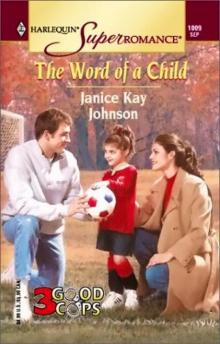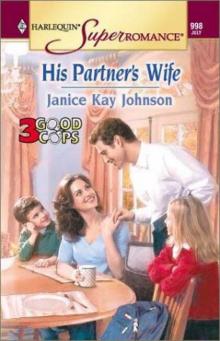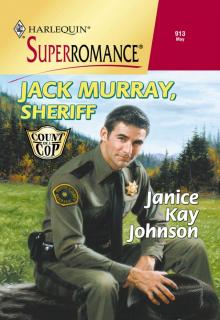- Home
- Janice Kay Johnson
Plain Refuge Page 8
Plain Refuge Read online
Page 8
Both dropped twenties on the table and they walked out together. Ben held out a hand. They shook, nodded again and parted ways.
Daniel wondered how Ben Slater felt about baseball. Maybe he’d enjoy a drive to St. Louis to watch the Cardinals lose to whatever team came to town to whip their asses.
* * *
MATTHEW SQUIRMED ON the bench beside her. He had been restless almost from the beginning of the service. Rebecca could follow along in the Ausbund, the fat hymnal that held all the words but no scores. The hymns were sung from memory, passed down from one generation to the next. The Ausbund was in High German, not the dialect spoken day to day, but enough had come back to Rebecca that she was better able to follow along. She had sung these hymns before. Traditionally coming second in the service, “O Gott Vater, wir Loben dich”—“O God the Father, We Praise You”—came to her as if it had been last summer she’d attended the every-other-week services, not eighteen years ago.
Amish children were included in prayer from the time they were toddlers, held on a parent’s lap with their hands clasped together for the prayer before meals. Only now that she was a parent did Rebecca realize that she had been coached in much the same way by her mother. Rebecca had never required Matthew to sit still without entertainment for more than half an hour at a time. TV was always available. Games, toys, books.
To him, the sermons in German had to be white noise. Even Rebecca had forgotten how hard it was to sit for hour upon hour on a backless bench. Very young children were sometimes taken out, nursing mothers were excused if they slipped out midway and the elderly were known to fall asleep, but everyone else remained attentive.
Rebecca gently rubbed Matthew’s back and hushed him quietly a couple of times. But he kept squirming. Right in the middle of the sermon, he slid off the bench to his feet, his voice ringing out.
“Mommy, I’m bored!”
The minister fell silent. Heads turned.
She closed her eyes in mortification but recognized defeat. Grimacing an apology at the women she had to pass, she hustled him outside and a short distance across the packed gravel to the scanty shade of an apple tree.
“Being bored is not an excuse for rudeness,” she said quietly. “You knew from last time what church would be like. I would have held you on my lap, or you could have leaned against me and napped. You’re a big enough boy to know better than to interrupt like you did.”
His face crumpled, but instead of crying, he spit out, “I want to go home! Dad wouldn’t make me come here.” Then he wrenched himself free of her hands and raced toward the house.
Feeling helpless, Rebecca stayed where she was, watching until another woman bent to catch him, spoke to him and led him to the long tables being set with food for the fellowship meal that followed the service. Confident he was safe and desperate to steal a moment to collect herself, she walked behind the parked buggies, then slipped between two of them and rested her arms on the fence. The fawn-brown dairy cows grazing in the pasture beyond the fence continued grazing, uninterested in her.
Had Matthew been using her to twist Tim with guilt into doing what he wanted? She would have liked to ask Tim, except...well, for the fact that he might be going along with a decision to kill her. She laughed without any humor. Yep, just a little complication in their ability to co-parent.
It stunned her that Matthew seemed so angry at her. She hadn’t seen any displays of stubbornness or defiance with his aunt and uncle or grandparents. Perhaps she should ask Mose. Especially now, with Grossdaadi failing, Mose frequently kept Matthew with him along with Abram. Matthew was proud because he was learning some farm chores. He had helped throw hay into mangers and even, in a small way, to harness a horse. Yesterday, Mose had put the two boys to work scrubbing a buggy. Matthew hadn’t seemed to mind.
So, why the anger at her? Had he guessed that she might really be taking him away from his father forever?
At the sound of an engine in the somnolent heat of the day, she turned her head. A marked police SUV approached slowly along the road. Feeling a flutter in her chest, she thought of stepping back between buggies. Would the driver see her?
When the vehicle eased to a stop on the shoulder of the paved country road, she knew he had.
CHAPTER SIX
THIS WAS STUPID. Daniel knew he should drive on. But he’d already set the emergency brake and turned on the warning lights. Ignoring his better judgment, he hopped out and strode up the lane to where Rebecca Holt stood, alone, hidden from the rest of the fellowship by the row of black buggies. The service couldn’t possibly be over. Why wasn’t she still in the barn?
“Rebecca.”
She eyed him skittishly. “Sheriff. What brings you out here today?”
“My deputies and I make a point of patrolling before and after church services. I worry with so many buggies on the roads.”
Fortunately, she didn’t point out that he was more than a little premature.
“Where’s Matthew?” he asked.
She turned back to face the dairy herd, her shoulders slumping. He hungrily studied the graceful line of her neck, bared between the simple, collarless dress and the kapp.
“He threw a temper tantrum in the middle of a sermon,” she said. “I had to take him out of the barn. When I let him know I was disappointed because he couldn’t be any more patient, he yelled at me and ran off.”
Daniel went on alert despite the stultifying heat. “You’re looking for him?”
“No, one of the women setting out food has him. I should be helping her since I didn’t go back into the service.”
“Do you understand the sermons?”
She smiled a little. “I’m afraid not. The Deitsch is coming back to me. Just everyday conversation, you know. But I can’t claim to be grasping the subtleties.”
Daniel leaned on the fence, too, but facing her. “It’s hard for a little boy when he doesn’t understand a word.”
Rebecca wrinkled her nose. “Are you chiding me? You don’t have to. I’m the one who was impatient. And everyone there knows—” She came to a sudden stop, the whites of her eyes showing.
“That neither of you are Amish?” he said sardonically. “That he doesn’t speak Deitsch, far less understand the High German used by the ministers?”
“I don’t suppose he’d appreciate what they were saying even if he did.”
He laughed. “No, I remember being hideously bored during church services. I was glad when I was old enough to sit with friends and not be under my father’s eagle eye. We managed to pass a few notes and poke each other with our elbows, unseen by our elders.”
Rebecca smiled at him, her eyes sparkling, the curve of her lips tempting. “I’ll bet you didn’t announce how bored you were out loud.”
“Is that what he did?” Chuckling, Daniel shook his head. “I wouldn’t have dared. Was it Bishop Jonas speaking? My impression is that he, at least, has a sense of humor.”
She rolled her eyes. “Of course not. It was Amos King.”
The stern owner of the custom butcher shop. Daniel hid a grin. He had sometimes wondered why Amos hadn’t moved to southern Missouri, where the Amish settlements were considerably more conservative.
“I should go back.”
He leaned against the fence. “I’ve been meaning to catch up with you, anyway. Unless someone will worry?”
He could tell she wanted to make an excuse to escape, but after a moment she shook her head. “No, I doubt anyone will miss me for a few minutes.”
She returned her gaze to the cows. He looked at her.
“I searched for your ex-husband and father-in-law online.” When he saw the alarm flaring on her face, he shook his head. “I read newspaper articles on my personal tablet, that’s all. There were plenty of them. Even your house was featured in a Sunday suppl
ement.”
She must have heard the question in his voice, because she said, “Tim built it for me. Only, he never asked what I liked.” Her sigh was almost soundless and somehow...sad. “It’s hideous. The house, I mean.”
“Wouldn’t appeal to me,” he admitted, thinking that was more tactful than an outright agreement.
For a minute, the familiar drone of cicadas was the only sound. Then Rebecca glanced at him. “I suppose you read about the embezzlement.”
“Kind of jumps out at you. I couldn’t help wondering if you were still married during that mess.”
She nodded. “The worst was the several months before it all came out.”
“All came out? You mean, when Stowe took off.”
Her eyes skipped away from his, then came back. “Yes. I knew something was wrong. Tim was...tense, all the time, but he would never say why. He just...withdrew. I found myself living with a stranger. If I pushed him to talk, he’d get angry. Once he—” she sneaked a look at Daniel “—he shoved me so hard, I slammed into the corner of a kitchen cabinet. That was the only incident I’d call violent, and he horrified himself.” She hunched her shoulders. “Weirdly, once everything came to a head, I could tell he was relieved. He became, I don’t know, more himself again.”
“Relieved?” Not the usual reaction to finding out a trusted partner had just ripped off a significant portion of the assets of the company you’d built.
Rebecca nibbled on her lip. “It...seemed odd to me, too, but I decided that the hardest part had been knowing something was wrong, but not what. I’m guessing he and Steven and Josh were arguing. Blaming each other for financial problems. Once Tim knew what he had to deal with and could make a plan, he seemed certain they could ride it out.”
Daniel supposed that made sense. The unknown was the most frightening. He couldn’t feel a drop of sympathy, however.
“So he gave a sigh of relief and took you out for a romantic dinner?”
“Something like that.” Now she met his eyes squarely. “He thought we could go happily on, as if the past few months hadn’t happened. That’s when I left him. I supported him through the worst, but I no longer liked or respected him.”
A sudden burst of voices from the direction of the barn signaled that his time was up.
“Do you have a cell phone?” he asked.
“No, I left it behind so it couldn’t be used to trace us. And I promised my aunt and uncle that, while we’re with them, we will live plain.”
“You might talk to them. If you agree not to use it except for emergencies, they might agree. We could get you a cheap, pay-as-you-go phone.”
“But I’d have no way to charge it,” she pointed out. “And the phone shanty isn’t far.”
No, it wasn’t; it sat right between the Grabers and the neighboring farm, owned by Noah Yoder. But getting to it meant cutting through a cornfield and squeezing through strands of a barbed-wire fence or walking down the road. The small wooden enclosure was open to the road, too—no place to hide if someone was hunting you.
“All right,” he said reluctantly. “You’ve been here, what, two and a half weeks? And there hasn’t been even a hint that your ex-husband has located you? He may just be waiting, assuming that because of Matthew you’ll eventually get in touch.”
“Maybe,” she agreed, but doubt leaked through. She didn’t believe Tim Gregory would wait, maybe because she knew the man to be impatient by nature. Daniel could understand a father frantic to find his missing child.
He would really like to see the custody agreement. Something about Rebecca Holt got to him, which made him vulnerable to being manipulated. Her family here would have accepted whatever she said at face value. But what if Tim had primary custody, not her at all, and she was the one breaking the law by fleeing with her son? The rest of her story could be a smoke screen.
Except he’d seen her bruised face. And seen how afraid she was, how haunted. He half lifted his hand, wanting to comfort her, to touch her cheek, rosy now like the sun-kissed skin of a ripe peach.
“When you looked online,” she said suddenly, “did you see anything about me taking off? It might have made the news if he’d reported Matthew and me missing.”
“Nothing,” he said. “Custodial interference would be taken seriously, of course.” She didn’t noticeably react, so he continued, “I doubt the police would have taken a missing-persons report if it was obvious you had packed up and left voluntarily.”
“We...didn’t take all that much with us. Because I knew we wouldn’t need electronics or our Englisch clothes, and handling heavy suitcases when we kept changing buses didn’t seem like a good idea.”
“In other words, someone glancing around your apartment—house?—might not have been able to tell you had packed at all.”
“Except I had my purse, of course. And I paid the rent a few months in advance. Oh, and I got rid of all the disposable food.” Her nose wrinkled. “I couldn’t leave stuff rotting in the refrigerator or molding in drawers.”
“Who else had a key to your place?”
“Only the building management. They have to let themselves in for maintenance sometimes.”
They both heard a woman calling her name.
“I have to go.” Without so much as a goodbye, Rebecca whirled and hurried away. He lost sight of her as soon as a buggy blocked his view.
Daniel didn’t linger. He wouldn’t be welcome here on a church Sunday. If he was spotted, it would be an embarrassment to his parents. Getting into his patrol vehicle, he wondered if Rebecca had gotten to know his mother or sisters at all. It was a strange thought. As members of the same church district as Samuel Graber’s family, they had known she and her son were hiding from a bad man and weren’t really Amish long before he did.
As always, thoughts of his family made him aware of the hollow, chronic ache in his chest.
* * *
THE FOLLOWING SATURDAY, Daniel sat by the window in the Hadburg Café, idly watching the very occasional passerby as he sipped iced tea and waited for his burger and fries. Hot as it was, no one much wanted to be outside. Sometimes a heat wave led to an increase in crime, but this one seemed to have made people too enervated to cause trouble. His radio had been mostly silent today.
A few cars had passed, as well as some horses and buggies. While he watched, a few Amish men in their dark trousers, blue shirts, suspenders and straw hats had gone into the harness shop, some carrying straps of leather and buckles that probably needed to be repaired or replaced. From this angle, the only one Daniel had recognized was Isaac Bontrager, a man with a distinctively stork-like build and jerky gait.
Daniel’s food still hadn’t arrived when a silver sedan pulled to the curb across the street in front of Olde Country Antiques. The man who got out wore chinos, a powder blue polo shirt and sunglasses with a gold sheen. Everything he wore looked expensive. He closed his door, then took his time studying the businesses lining Grove Street. Odd to park before he’d spotted his destination, Daniel thought.
Deborah Chupp set his food down in front of him, but he kept an eye on the stranger even as he thanked her. If the man had been accompanying a wife eager to browse gift and quilt shops, Daniel wouldn’t have paid the same attention. As it was, the guy looked out of place.
Apparently making up his mind, the stranger walked halfway up the block to Miller’s General Store. Heck, he might have just stopped on his way through town for something cold to drink or a snack. Still—why hadn’t he parked right in front, or in the lot to the side?
He strolled out a few minutes later, hands empty. Daniel popped a French fry in his mouth and watched as the man went into the fabric-and-quilt store, the harness shop, the creamery and an Amish furniture store. In fact, every business he had entered was clearly posted as Amish. He skipped the liquor store, the gas station and t
he town’s one-and-only real estate agency.
Then he crossed the street so that Daniel lost sight of him.
Done with his meal, Daniel dropped bills onto the table and called his thanks to Anna Mae Kemp, a distant cousin and widow who ran the café. When he stepped out on the sidewalk, he couldn’t see the stranger, so he crossed the street and went into the general store.
Slow day like this, Yonnie Miller seemed to be alone, desultorily stocking shelves that held single-serving snack foods.
“Yonnie.” Daniel nodded. “A fellow came in here a minute ago.”
“Ja, Englisch.”
“Looking for something you don’t sell.”
“Seemed so.”
“Mind telling me what?”
Yonnie considered for a minute. “Said he heard some Amish hereabouts breed Percheron horses.” He shrugged. “I told him about Willard Hostetler and Big Ike and Little Ike Mast.”
“Not Samuel Graber?”
“No. Thinking two was enough.”
“Did he ask for directions?”
“I offered and wrote them down. He shoved the piece of paper in his pocket, not so careful.”
Daniel had no trouble with the subtext of this conversation. Yonnie wasn’t a member of the Grabers’ church district, but he had heard something, enough to know not to send a stranger to Samuel Graber’s farm.
“Denke.” Daniel then said in Pennsylvania Dutch, “Just curious, I am. He seems to be walking around town asking questions.”
“Ja, lots of questions, that one.”
Back out on the sidewalk, he took the time to jot down the license-plate number and make and model of car, although he felt sure it would turn out to be a rental. Then he went into the fabric store, where his appearance created a flutter of interest in the group of ladies seated around a quilt frame in the back room. A log-cabin quilt in sunny colors was stretched in the frame.
“Don’t get up,” he said when Gloria Wagler started to stand. “Just wondered what the Englisch man wanted. He seems to be checking out all the businesses.”

 Home Deadly Home
Home Deadly Home From Father to Son
From Father to Son All the Lost Little Horses (A Desperation Creek Novel Book 2)
All the Lost Little Horses (A Desperation Creek Novel Book 2) Hide the Child
Hide the Child Within Range
Within Range Between Love and Duty
Between Love and Duty First Comes Baby
First Comes Baby Charlotte's Homecoming
Charlotte's Homecoming In A Heartbeat (HQR Superromance)
In A Heartbeat (HQR Superromance) The Call of Bravery
The Call of Bravery In Hope's Shadow
In Hope's Shadow Anything for Her
Anything for Her Harlequin Superromance September 2014 - Bundle 1 of 2: This Good ManPromises Under the Peach TreeHusband by Choice
Harlequin Superromance September 2014 - Bundle 1 of 2: This Good ManPromises Under the Peach TreeHusband by Choice The Baby Agenda
The Baby Agenda More Than Neighbors
More Than Neighbors Her Amish Protectors
Her Amish Protectors All That Remains
All That Remains Whisper of Revenge (A Cape Trouble Novel Book 4)
Whisper of Revenge (A Cape Trouble Novel Book 4) In a Heartbeat
In a Heartbeat A Mother's Claim
A Mother's Claim Because of a Girl
Because of a Girl Back Against the Wall
Back Against the Wall Dangerous Waters
Dangerous Waters Mommy Said Goodbye
Mommy Said Goodbye A Mother's Secret
A Mother's Secret See How She Runs (A Cape Trouble Novel Book 2)
See How She Runs (A Cape Trouble Novel Book 2) Plain Refuge
Plain Refuge Bringing Maddie Home
Bringing Maddie Home For the Girls' Sake
For the Girls' Sake Through the Sheriff's Eyes
Through the Sheriff's Eyes Yesterday's Gone (Two Daughters Book 1)
Yesterday's Gone (Two Daughters Book 1) All a Man Is
All a Man Is Harlequin Superromance January 2014 - Bundle 1 of 2: Everywhere She GoesA Promise for the BabyThat Summer at the Shore
Harlequin Superromance January 2014 - Bundle 1 of 2: Everywhere She GoesA Promise for the BabyThat Summer at the Shore No Matter What
No Matter What Wakefield College 01 - Where It May Lead
Wakefield College 01 - Where It May Lead Someone Like Her
Someone Like Her THE WORD OF A CHILD
THE WORD OF A CHILD Harlequin Superromance May 2016 Box Set
Harlequin Superromance May 2016 Box Set Open Secret
Open Secret The New Man
The New Man Finding Her Dad
Finding Her Dad The Perfect Mom
The Perfect Mom All Through The House
All Through The House Match Made in Court
Match Made in Court Making Her Way Home
Making Her Way Home From This Day On
From This Day On To Love a Cop
To Love a Cop The Hero's Redemption
The Hero's Redemption HIS PARTNER'S WIFE
HIS PARTNER'S WIFE Jack Murray, Sheriff
Jack Murray, Sheriff Dead Wrong
Dead Wrong Twisted Threads (A Cape Trouble Novel Book 3)
Twisted Threads (A Cape Trouble Novel Book 3) Bone Deep
Bone Deep The Closer He Gets
The Closer He Gets With Child
With Child Whose Baby?
Whose Baby? Kids by Christmas
Kids by Christmas